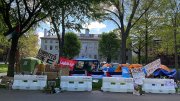UPDATE: May 20, 11:45 A.M.
On Friday, May 17, Harvard College placed 23 students on multi-semester probation and suspended five students for their involvement in the Yard encampment, according to Harvard Out of Occupied Palestine (HOOP). The group says that 12 students will be prevented from graduating. More than 35 student organizations spoke out against the disciplinary action, according to HOOP.
In a May 14 email announcing the peaceful end of the encampment, interim president Alan M. Garber asked schools to “promptly initiate applicable reinstatement proceedings for all individuals who have been placed on involuntary leaves of absence,” and requested that disciplinary boards “evaluate expeditiously, according to their existing practices and precedents, the cases of those who participated in the encampment.”
Elsewhere on campus, two Harvard graduate students have been charged with misdemeanors (assault and battery and violations of the Massachusetts Civil Rights Act) for their confrontation with an Israeli student during an October pro-Palestine protest at Harvard Business School, The Crimson reports. The graduate students each face up to 200 days in jail.
UPDATE: May 14, 3:45 P.M.
Early Tuesday morning, Harvard Out of Occupied Palestine (HOOP) ended its encampment in Harvard Yard. According to HOOP, the protesters negotiated a settlement with the administration. In a community-wide email, interim president Alan M. Garber announced that he will “facilitate a meeting with the chair of the Corporation Committee on Shareholder Responsibility and other University officials to address questions about the endowment,” and that he and dean of the faculty of arts and sciences (FAS) Hopi Hoekstra will “meet with students to hear their perspectives on academic matters related to longstanding conflicts in the Middle East.” Garber asked schools to quickly reinstate protesters placed on involuntary leaves of absence and urged disciplinary boards to “evaluate expeditiously…the cases of those who participated in the encampment.”
In a statement on Instagram, HOOP wrote, “We are under no illusions: we do not believe these meetings are divestment wins. These side-deals are intended to pacify us away from full disclosure & divestment. Rest assured, they will not.”
At the end of his community message, Garber encouraged civil dialogue. “I acknowledge the profound grief that many in our community feel over the tragic effects of the ongoing war. There will continue to be deep disagreements and strongly felt emotions as we experience pain and distress over events in the wider world. Now more than ever, it is crucial to do what we do at our best, creating conditions for true dialogue, modeling ways to build understanding, empathy, and trust, and pursuing constructive change anchored in the rights and responsibilities we share.”
In a Monday afternoon email to the FAS community, Hoekstra reaffirmed the University's commitment to respectful, robust discourse. "While the encampment itself has ended, the humanitarian crisis continues, as will our community’s efforts to grapple with its effects. Now is the time for true and meaningful dialogue, and I look forward to joining President Garber in discussions regarding academic matters relating to the longstanding conflicts in the Middle East. We began the spring semester with a commitment to dialogue and to strengthening the bonds that pull us together as a community. With these events, that commitment has only deepened. Coming out of a year where the challenges have felt relentless, we must now advance that work with intentionality, humility, and care, knitting back together the community that makes our academic mission, and all it contributes to the world, possible."
Below, read an account of the dwindling encampment from Monday, May 13, originally published as "The Ghost of Harvard's Encampment."
Monday morning, the pro-Palestine encampment established on April 24 on Harvard Yard was quiet. In the wake of the University’s decision to place the students tenting in the Old Yard on “involuntary leave” last week and the annual end-of-term move out of underclassmen, only four protesters were in evidence on the breezy spring morning. But despite the camp’s seemingly diminished population, its physical footprint has continually expanded.
There are three tents on the east side of University Hall, squarely in Tercentenary Theatre, where the University is setting up for Commencement. (No protesters were seen in the eastern portion of the encampment Monday morning around 10 A.M.) There are still about 47 tents in the Old Yard. Some look slept in, others are filled with supplies, and others hold books, but most are completely zipped up. Near Johnston Gate, protesters planted lawn signs with photos of Palestinians killed in the war. (Johnston Gate remains closed, though Harvard University Police Department says that protesters cut its lock with bolt cutters during a Saturday afternoon demonstration.)
Harvard’s security protocols limit the encampment’s potential for growth. The Harvard Yard gates remain closed, and entrants must get their Harvard IDs scanned by Harvard Security. Students on involuntary leave are technically barred from campus, and presumably, their IDs are invalidated, making it impossible for those who leave to re-enter.
The encampment takes up space not only in Harvard Yard but also in the minds of Harvard faculty. Last week, two groups of Harvard affiliates sent dueling letters to the administration. On May 6, about 325 faculty members urged interim president Alan Garber “to meet and engage in meaningful dialogue with peacefully protesting students.” (He did meet with a group of the protesting students on May 8, according to The Crimson and other reports.) On May 9, about 210 Harvard affiliates asked Garber “to end the encampment swiftly and as peacefully as possible, so that the academic missions of our community…can go forward without further disturbance.”
As Commencement approaches, the fate of the Boston area’s final pro-Palestine campus encampment remains unclear.









